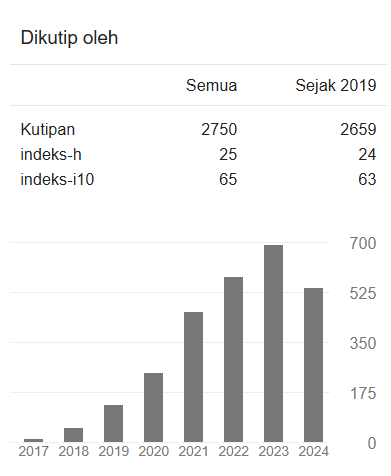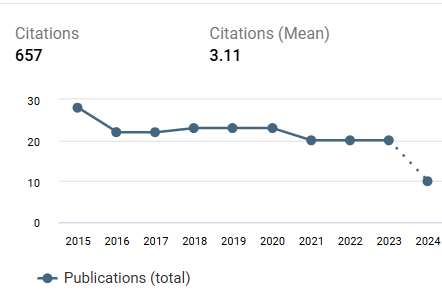MEMBANGUN KARAKTER SISWA SEKOLAH DASAR MELALUI PRAKTEK POLA ASUH ORANG TUA BERDASARKAN GENETIC PERSONALITY
DOI:
https://doi.org/10.22219/jinop.v6i1.10196Keywords:
parenting style, pengembangan karakter anak, personality genetic, pola asuh.Abstract
Pendidikan karakter penting untuk menjadi mainstream pokok pendidikan di Indonesia baik di ranah formal, nonformal maupun informal. Terdapat beberapa faktor yang mempengaruhi pengembangan karakter anak, di antaranya adalah pola asuh di keluarga (parenting style) dan genetic personality. Penelitian ini bertujuan untuk mengetahui pengaruh parenting style dan genetic personality terhadap pengembangan karakter anak. Jenis penelitian adalah korelasional menggunakan metode survei dengan pendekatan penelitian kuantitatif. Populasi sekaligus sample penelitian ini adalah orang tua siswa Taman Kanak-kanak di Tangerang sebanyak 90 orang. Teknik pengumpulan data menggunakan kuesioner (angket) yang disusun berdasarkan skala Likert. Instrumen yang digunakan untuk mengukur pola asuh parenting style merupakan hasil modifikasi dari Parenting Style Questionnaire (PSQ) (Robinson et al., 1995) dan (Roman et al., 2015). Instrumen untuk mengukur genetic personality diadaptasi dari (Poniman & Mangussara, 2013), sedangkan untuk mengukur pengembangan karakter anak menggunakan adaptasi dari (Poniman, 2014). Analisis pada penelitian ini menggunakan SEM (Structural Equation Model) dengan software SmartPLS versi 3.0. Hasil penelitian menunjukkan bahwa parenting style dan genetic personality berpengaruh positif dan signifikan terhadap pengembangan karakter anak.
Downloads
References
Abidin, A. R. (2011). Analisis Gender pada Gaya Pengasuhan, Proses Pembelajaran di Kelas, Perilaku Sosial dan Prestasi Belajar Siswa SMA di Kota Bogor. IPB.
Afifah, A. (2019). Selama 2018, KPAI Terima Pengaduan 4.885 Kasus Anak. http://www.dakta.com/news/17920/selama-2018-kpai-terima-pengaduan-4885-kasus-anak
Aziz, A. H. (2012). Pendidikan Karakter Berpusat pada Hati. Al Mawardi Prima.
BKKBN. (n.d.). Peraturan Pemerintah Nomor 21 Tahun 1994.
Carey, G., & DiLalla, D. L. (1994). Personality and Psychopathology: Genetic Perspectives. Journal of Abnormal Psychology, 103(1), 32–43. https://doi.org/10.1037/0021-843X.103.1.32
Efobi, A., & Nwokolo, C. (2014). Relationship between Parenting Styles and Tendency to Bullying Behaviour among Adolescents. Journal of Education & Human Development, 3(1), 507–521. www.aripd.org/jehd
Ferguson, C. J. (2010). Genetic contributions to antisocial personality and behavior: A meta-analytic review from an evolutionary perspective. Journal of Social Psychology, 150(2), 160–180. https://doi.org/10.1080/00224540903366503
Ghozali, I. (2014). Structural Equation Modeling, Metode Alternatif dengan Partial Least Square (PLS) (4th ed.). Badan Penerbit Universitas Diponegoro.
Hasnain, N., Faraz, B., & Adlakha, P. (2013). Self-Esteem And Happiness Of Children And Mothers Of Different Parental Authority. The International Journal Of Humanities & Social Studies, 1(3), 1–6. http://internationaljournalcorner.com/index.php/theijhss/article/view/128036/88710
Huver, R. M. E., Otten, R., de Vries, H., & Engels, R. C. M. E. (2010). Personality and parenting style in parents of adolescents. Journal of Adolescence, 33(3), 395–402. https://doi.org/10.1016/j.adolescence.2009.07.012
Johari Talib, Zulkifli Mohamad, & Maharam Mamat. (2011). Effects of Parenting Style on Children Development. World Journal of Social Sciences, 1(2), 14–35. http://www.wjsspapers.com/static/documents/May/2011/2. Johari.pdf
Jönsson, E. G., Von Gertten, C., Gustavsson, J. P., Yuan, Q. P., Lindblad-Toh, K., Forslund, K., Rylander, G., Mattila-Evenden, M., Åsberg, M., & Schalling, M. (2001). Androgen receptor trinucleotide repeat polymorphism and personality traits. Psychiatric Genetics, 11(1), 19–23. https://doi.org/10.1097/00041444-200103000-00004
Misbach, I. H. (2010). Dahsyatnya Sidik Jari Menguak Bakat dan Potensi untuk Merancang Masa Depan Melalui Fingerprint Analysis. Visi Media.
Murakami, K. (2012). The Miracle of DNA. Mizan Media Utama.
Murakami, K. (2013). Misteri DNA. Gramedia.
Musrofi. (2011). Potensi Preneur. Talents Center.
Nooraini Othman, & Salasiah Khairollah. (2013). Explorasi Hubungan Antara Personaliti Islamik Dan Gaya Keibubapaan. International Journal of Islamic Thought, 4(Rohana 2010), 48–57.
Nyarko, K. (2011). The influence of authoritative parenting style on adolescents’ academic achievement. American Journal of Social and Management Sciences, 2(3), 278–282. https://doi.org/10.5251/ajsms.2011.2.3.278.282
Oktafiany, N. D. (2013). Correlation of Parenting Method to the Sudents Emotional Quotients of Diponegoro 1 Jakarta Junior High School. Jurnal UNJ Online, 1(2).
Poniman. (2014). Kubik Leadership Solusi Esensial Meraih Sukses dan Hidup Mulia. Kompas Gramedia.
Poniman, F., & Mangussara, R. A. (2012). Konsep Palugada STIFIn. STIFIn Institute.
Poniman, F., & Mangussara, R. A. (2013). STIFIn Personality. STIFIn Institute.
Pratiwi, S. (2015). Kecerdasan Moral Anak Usia Prasekolah Etnis Cina Ditinjau dari Gaya Pengasuhan Orang Tua. Proceeding Seminar Nasional Positive Psychology 2015.
Puspitawati, H., & Sarma, M. (2012). Sinergisme Keluarga dan Sekolah. IPB Press.
Robinson, C. C., Mandleco, B., Olsen, S. F., & Hart, C. H. (1995). Parenting Practices: Development of a New Measure. Psychological Reports, 77, 819–830.
Roman, N. V., Davids, E. L., Moyo, A., Schilder, L., Lacante, M., & Lens, W. (2015). Parenting styles and psychological needs influences on adolescent life goals and aspirations in a South African setting. Journal of Psychology in Africa, 25(4), 305–312. https://doi.org/10.1080/14330237.2015.1078087
Samani, M., & Hariyanto. (2011). Konsep dan Model Pendidikan Karakter. Remaja Rosdakarya.
Santrock, J. W. (2008). Psikologi Pendidikan. Kencana Prenada.
Setiawan, D. (2018). KPAI Catat Anak Dimanfaatkan Jadi Kurir Narkoba. https://www.kpai.go.id/berita/kpai-catat-anak-dimanfaatkan-jadi-kurir-narkoba
Sugiyono. (2014). Metode Penelitian Kuantitatif dan Kualitatif. Alfabeta.
Utomo, D. (2014). Intensi Perilaku Prososial Anak Ditinjau dari Gaya Pengasuhan. Jurnal Online Psikologi, 2(1). http://ejournal.umm.ac.id/index.php/cognicia/article/view/1817/1917
Downloads
Published
How to Cite
Issue
Section
License
Copyright Notice
Authors who publish with JINoP (Jurnal Inoasi Pembelajaran) agree to the following terms:
- For all articles published in the JINoP (Jurnal Inovasi Pembelajaran), copyright is retained by the authors. Authors give permission to the publisher to announce the work with conditions. When the manuscript is accepted for publication, the authors agree to the automatic transfer of the publishing right to the publisher.
- Authors retain copyright and grant the journal the right of first publication with the work simultaneously licensed under a Creative Commons Attribution 4.0 International License. that allows others to share the work with an acknowledgment of the work's authorship and initial publication in this journal.
- Authors are able to enter into separate, additional contractual arrangements for the non-exclusive distribution of the journal's published version of the work (e.g., post it to an institutional repository or publish it in a book), with an acknowledgment of its initial publication in this journal.
- Authors are permitted and encouraged to post their work online (e.g., in institutional repositories or on their website) prior to and during the submission process, as it can lead to productive exchanges, as well as earlier and greater citation of published work (See The Effect of Open Access).








